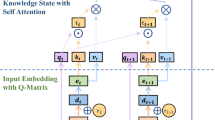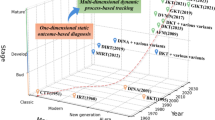Abstract
In order to evaluate the level of knowledge acquired by students, this study presents the contents of the students’ knowledge using a proposed novel method to monitor a knowledge map and to diagnose them. To do so, we propose a method to improve the accuracy of diagnoses by comparing the level of the surrounding knowledge related to the knowledge, rather than the level of the knowledge itself, to correct the evaluation value. Moreover, in visualizing the relationship between knowledge objects based on knowledge evaluation data using an ontological structure, the Deep Sparse Neural Network model of deep learning is applied, and the map is regarded as one neural network and is proposed to express the quantitative value using the weight instead of the qualitative concept of ontology. The proposed knowledge map visualization can monitor the relationship and relevance (weight) of the related knowledge level at a glance, so that it is possible to intuitively grasp the result with the quantitative knowledge diagnosis and to improve the efficiency of knowledge evaluation and the accurate evaluation of knowledge diagnoses.











Similar content being viewed by others
Explore related subjects
Discover the latest articles, news and stories from top researchers in related subjects.References
Ausubel D (2012) The acquisition and retention of knowledge: a cognitive view. Kluwer Academic Publishers, Dordrecht
Cañas A, Novak J (2009) What is a concept map? @ONLINE. http://cmap.ihmc.us/docs/conceptmap.php
Goyal M, Yadav D, Tripathi A (2017) An intuitionistic fuzzy approach to classify the user based on an assessment of the learner’s knowledge level in e-learning decision-making. J Inf Process Syst 13:57–67. https://doi.org/10.3745/JIPS.04.0011
Gruber T (2009) Ontology. Encyclopedia of database systems. Springer, New York, pp 1963–1965
Heritage M, Kim J, Vendlinski T, Herman J (2008) From evidence to action: a seamless process in formative assessment?: CRESST report 741. ERIC Clearinghouse
Ifenthaler D, Hanewald R (2013) Digital knowledge maps in education: technology-enhanced support for teachers and learners. Springer, New York
Islam MN, Islam AKMN (2016) Ontology mapping and semantics of web interface signs. Hum Centric Comput Inf Sci 6(1):20. https://doi.org/10.1186/s13673-016-0077-y
LeCun YA, Bottou L, Orr GB, Müller KR (2012) Efficient backprop in neural networks: tricks of the trade. Springer, Berlin, pp 9–48. https://doi.org/10.1007/978-3-642-35289-8-3
Lee S (2018) The method of knowledge diagnosis using knowledge map based on ontology. KR Patent 10-1820635
Novak J, Gowin D, Kahle J (1984) Learning how to learn. Cambridge University Press, Cambridge
Vijayarajan V, Dinakaran M, Tejaswin P, Lohani M (2016) A generic framework for ontology-based information retrieval and image retrieval in web data. Hum Centric Comput Inf Sci 6(1):18
Acknowledgements
This research was partly supported by National Research Foundation of Korea (NRF) Grant funded by Korea Government (MSIT) (NRF-2014M3C4A7030503, Next-Generation Information Computing Development Program) and Institute of Information and Communications Technology Planning and Evaluation (IITP) Grant funded by the Korea Government (MSIT) (no. 2019-0-00421, AI Graduate School Support Program).
Author information
Authors and Affiliations
Corresponding author
Additional information
Publisher's Note
Springer Nature remains neutral with regard to jurisdictional claims in published maps and institutional affiliations.
Rights and permissions
About this article
Cite this article
Choi, JY., Lee, JH., Cho, Y. et al. Visualization of knowledge map for monitoring knowledge diagnoses. J Ambient Intell Human Comput 13, 1615–1623 (2022). https://doi.org/10.1007/s12652-019-01407-x
Received:
Accepted:
Published:
Issue Date:
DOI: https://doi.org/10.1007/s12652-019-01407-x




